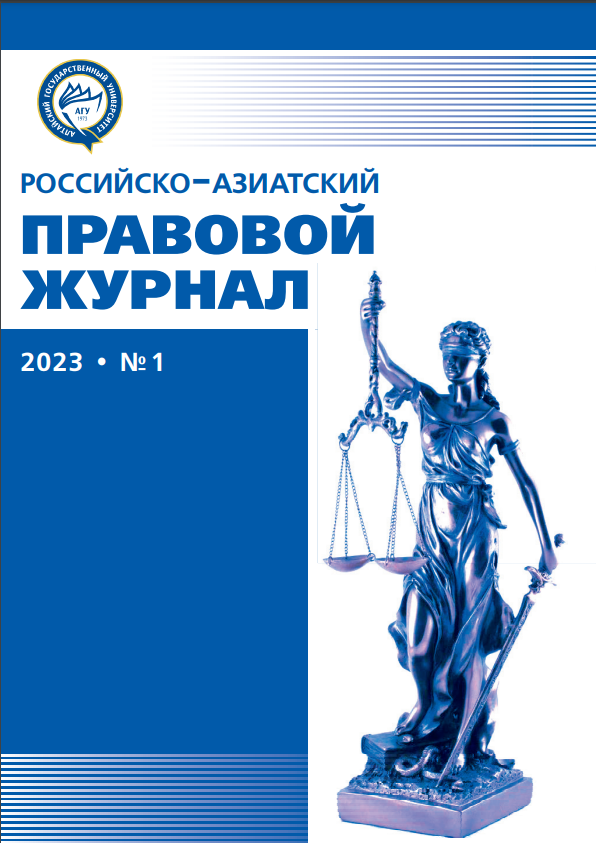CURRENT ISSUES OF THE INSTITUTE OF CROSS-BORDER BANKRUPTCY
УДК 347.1 ББК 67.930.0
Abstract
In modern conditions, the legal regulation of issues of cross-border insolvency of subjects of internationalprivate law is of particular importance due to the complication of the economic and foreign policy situationaround the world. In such conditions, urgent problems of protecting the rights and legitimate interestsof creditors acquire particular importance. The article deals with topical issues of the institution of crossborder bankruptcy and the tasks of improving insolvency procedures complicated by a foreign element.The authors identified the following most important and interesting problematic issues: 1) the problemof «bankrupt tourism» (and closely related issues of mutual recognition of court decisions and proceduralestoppel); 2) the problem of bringing the persons controlling the debtor to subsidiary liability; and 3) theproblematic aspects of conflict regulation of challenging and invalidating the debtor's transactions. Theauthors pay special attention to the complexity and ambiguous approaches to the choice of applicablelaw and appropriate bindings in such situations. As a result of studying Russian and foreign experience inapplying the norms of private international law in judicial practice in cases arising in the field of cross-borderbankruptcy, the authors came to the conclusion that the domestic legal framework for the legal regulation ofrelations in the field of cross-border bankruptcy needs further changes, primarily on the level of perceptionof universal or regional agreements, such as EU Regulation 20.05.2015 N 2015/848 (Recast), within whichmany contentious issues that arise when choosing the applicable law in matters of cross-border insolvency(bankruptcy) are settled. The Russian legislator should also pay close attention to the problems of crossborder insolvency in the current sanctions conditions, provide for mechanisms for the priority protection ofthe rights of domestic participants in economic turnover, while not excluding the positive foreign experienceof legal regulation in this area.
Downloads
References
2. Мохова Е. В., Ящук Н. П., Лиджанова А. Э. Forum shopping и конкуренция регулирования в трансграничных банкротствах и реструктуризациях // Закон. 2020. №9. URL: https://zakon.ru/ publication/igzakon/8343.
3. Полшкова М.И. Статут несостоятельности и lex fori concursus как основная коллизионная привязка // Вестник Университета имени О.Е. Кутафина (МГЮА). 2021. №3. С. 178–189.
4. Мохова Е.В. Центр основных интересов должника при трансграничной несостоятельности: перспективы введения в России новых правовых конструкций // Закон. 2012. №10. C. 111–127.
5. Козлов Ф. Трансграничное банкротство // ЭЖ-Юрист. 2016. №19. С. 4. URL: https://www.eg-online.ru/product/yurist/5260/.
6. Мохова Е.В. Трансграничные банкротства за рубежом и в России: в поисках баланса между универсализмом и территориальностью // Закон. 2016. №5. С. 137–149.
7. Костин А.А. Трансграничное банкротство и международный коммерческий арбитраж в РФ (процессуальные и материальные аспекты) // Вестник экономического правосудия Российской Федерации. 2019. №9. С. 120–142.
8. Бибиков С.Е. Коллизионно-правовое регулирование ответственности контролирующих должника лиц в отношениях трансграничной несостоятельности // Вестник Университета имени О.Е. Кутафина (МГЮА). 2021. №3. С. 212–218.
9. Vandekerckhove K. Piercing the Corporate Veil: A Transnational Approach (European Company Law). Publisher: Kluwer Law International, 2007.
10. Полшкова М. И. Коллизионное регулирование недействительности сделок должника при трансграничной несостоятельности // Актуальные проблемы российского права. 2021. № 1(122). С. 147–155.
Russian-Asian Law Journal is a golden publisher, as we allow self-archiving, but most importantly we are fully transparent about your rights.
Authors may present and discuss their findings ahead of publication: at scientific conferences, on preprint servers, in public databases, and in blogs, wikis, tweets, and other informal communication channels.
Russian-Asian Law Journal allows authors to deposit manuscripts (currently under review or those for intended submission) in non-commercial, pre-print servers such as ArXiv.
Authors who publish with this journal agree to the following terms:
- Authors retain copyright and grant the journal right of first publication with the work simultaneously licensed under a Creative Commons Attribution License that allows others to share the work with an acknowledgement of the work's authorship and initial publication in this journal.
- Authors are able to enter into separate, additional contractual arrangements for the non-exclusive distribution of the journal's published version of the work (e.g., post it to an institutional repository or publish it in a book), with an acknowledgement of its initial publication in this journal.
- Authors are permitted and encouraged to post their work online (e.g., in institutional repositories or on their website) prior to and during the submission process, as it can lead to productive exchanges, as well as earlier and greater citation of published work (See The Effect of Open Access).








